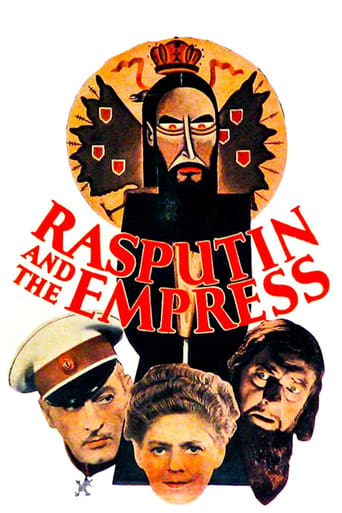kenbarr-ny
As previously noted in other reviews, this movie has plenty of historical errors (Nicholas II wanted a Duma, Rasputin favored Russia's entry into World War I, the Tsarevich's family nickname and on and on). As Robert Wuhl says, remember that movies are often "based on a true story." However, the value of the film is that is a good example of acting, directing and writing in the 1930s. The presence of the three Barrymores also makes this film interesting. Given the back story of how this movie was made, we also see the power of the studio executives, such as Irving Thalberg, had in how stories were constructed. The story is contrived, so don't use this movie as a factual representation of the events of the period. Watch it instead for the acting of the Barrymores, who were far more familiar to stage audiences than cinema's.
marcslope
The only film featuring all three Barrymores preserves an acting style that was once considered top-line and now looks rather over-emphatic. Certainly Lionel is the biggest ham, looking like Alec Guinness in "Oliver Twist" and rolling his eyes, laughing maniacally, and all but twirling his cape as the contemptible, going-mad Rasputin. By contrast, Ethel is stately as the Empress Alexandra, but also rather uninteresting, mainly emphasizing womanly dignity and reserve, as she so often did. Often she and Diana Wynyard seem to be in a contest to see who can employ a more highfalutin pronunciation style. So it falls to John to give the best performance: He's comparatively naturalistic and understated, and seems most comfortable in front of a camera. The director, Richard Boleslawski, goes in for needlessly arty compositions and drags out the playing time, and Herbert Stothart, the composer, seems the hardest worker: so much Russian-cliché music, and so loud. Charles MacArthur's screenplay is literate but wordy and inaccurate (and resulted in an expensive lawsuit against MGM). But as a distillation of the Barrymore acting style in miniature, it's a valuable artifact, and pretty entertaining on its own terms.
David_Brown
This movie is important because of course, it is the only one that had all three Barrymores. But it is really Johm's Film. Every scene he is in he steals. Spoiler: In particular the scene where the young Czarevitch bites him, and the final fight against Rasputin. What is amazing is everyone else in this film is either naive or totally evil. John's Paul Chegodieff is the only one who is neither. I have never seen a Barrymore silent film (When everyone says he was at his best), but I have seen most of his talkies, and he is always good. Lionel's Rasputin is way over the top and Ethel, even though it was supposed to be history, essentially plays the same kind of character we saw in "Kind Lady", and the "Portrait of Jenny". I give it 5 out of 10 stars, mostly for John.
longrush
While this film may be of interest to film purists because of the three Barrymores together for the only time, the movie is lousy history. The acting is more than a bit overdone, a carryover perhaps from the silent days when double takes and facial quirks had to tell the story. Rasputin's death is inaccurate. He was probably not poisoned at all (as an ascetic, he did not eat sweets, poisoned or otherwise), and he was shot several times, not hit over the head with a poker. And the deaths of the Romanovs was not outside in a courtyard but in a closed, dingy cellar. Their doctor died with them--he didn't escape to London. However, in defense of the screenwriter, many of the details of the Rasputin/Romanov disaster were unknown until after the fall of the Soviet Union. Several books published since, including photographs of Rasputin's dead body, for example, do much to fill out the real story.



